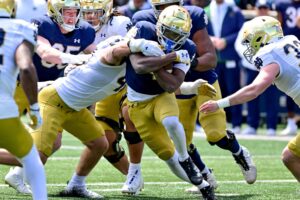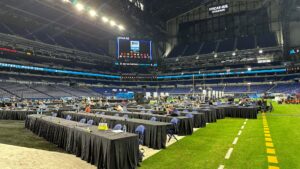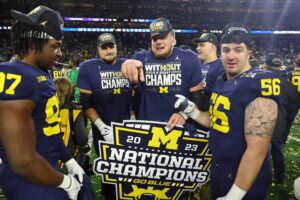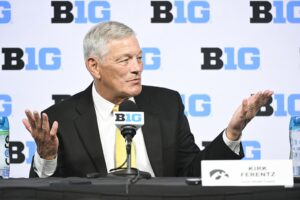NCAA Set to Approve NIL Compensation Rules
We have been closely following the NCAA’s progress toward uniform guidance, rules, or regulations concerning student-athlete compensation for the use of their name, image, and likeness, known as NIL compensation. With several states’ legislation permitting NIL compensation set to take effect on July 1, we wrote last month that the NCAA needed to act soon. We suspected that the NCAA might seek to enjoin those states’ laws. In the meantime, the Supreme Court raised foundational questions about the NCAA’s entire model. That decision substantially weakened the NCAA’s prospects of getting an immediate injunction. As a result, the NCAA will vote on proposed interim rules and guidance. As such, we see the NCAA set to approve NIL rules in the middle of this week.
Increasing Pressure From Various Sources
Over the last several years, various groups placed increasing pressure on the NCAA to alter its amateurism model. Some sought additional stipends or profit-sharing models to benefit student-athletes. Others sought increased academic benefits. Others simply sought to free student-athletes to sell their own names, images, and likenesses.
Within the past several years, the legal and legislative battles ensued. Former players enlisted counsel to file a pair of important class action lawsuits. (There were others, but these two gained the most traction.) In O’Bannon v. NCAA, former student-athletes argued that the continued use of the likenesses without benefit violated antitrust laws and privacy rights. Ed O’Bannon, a former UCLA basketball player, led the plaintiffs. The trial court agreed and awarded damages to former student-athletes. The decision specifically held that a bar on athletes’ receipt of payment from third parties for the use of their image violated antitrust laws. More recently, former West Virginia Mountaineer running back Shawne Alston argued that the NCAA’s rules barring certain non-cash education-related benefits violated antitrust laws. Ultimately (and quite recently), the Supreme Court agreed.
In the meantime, various states passed laws that allowed student-athletes to receive NIL compensation from third parties without impact eligibility under defined circumstances. That began with the State of California, as we wrote here. More recently, a handful of states passed laws set to go into effect July 1, 2021, that specifically prohibit institutions from declaring student-athletes ineligible for receiving NIL compensation.
Faced with these sources of pressure, the NCAA had little choice but to act “fast.” Of course, as we wrote over 18 months ago, the NCAA began “studying” the bounds of an NIL compensation model. After dragging their feet in the interim, we see the NCAA set to approve NIL rules.
Weighing The Options
We can guess, of course, that the NCAA strongly considered filing suit to enjoin the various state laws from taking effect. The NCAA would have argued that the disparate laws would detrimentally impact its conferences and member-institutions that had to abide by different sets of rules. That said, the recent decision by the Supreme Court likely counseled it to scramble to approve interim rules.
During its study period, however, the NCAA surely had to grapple with several of the issues we wrote about here. For example, who, exactly, would pay the student-athletes? Would the NCAA receive payments and distribute to its student-athletes? Would the conferences or schools do that instead? Or would the NCAA simply allow the student-athletes to fend for themselves? And what limits would there be?
Various writers, including us, expressed other concerns. How would the NCAA draw a line between “pay-for-play” models and true NIL compensation? How would the NCAA seek to preserve some competitive balance by preventing schools from associating with organizations willing to pay influencers? Could schools use NIL compensation sources unique to that school in recruiting? Indeed, various concerns abound still, and the NCAA interim guidance remains in place until Congress passes a law (which, as we know, could take years).
NIL Compensation Rules Inbound
According to various sources, the NCAA will approve its interim NIL rules and guidance on June 30. Currently, only draft rules are available for review, though we anticipate few changes over the next 24 hours or so. The Athletic initially circulated the draft rules, which were tweeted here:
Here's the draft (not final) version of what the NCAA is calling its interim NIL policy, obtained by @TheAthletic. Board is expected to approve the temporary guidance on Wednesday, per sources.
Plus, docs outlining prohibitions and delineation of regulatory responsibilities: pic.twitter.com/V326Y7GKdy
— Nicole Auerbach (@NicoleAuerbach) June 26, 2021
The interim rules begin with the basic proposition. Athletes in states that passed NIL laws could engage in NIL activities without issue. For athletes in states without NIL laws, their engaging in NIL activities would also not impact eligibility. In both instances, however, the schools and the NCAA retain the ability to exercise oversight to draw a bright line between true NIL compensation and “pay-for-play” and recruiting violations.
Important Limitations on NIL Compensation Rules
Indeed, we must make an important distinction. Under these rules (and the various state laws), the schools are not paying players; instead, payments come from third-party advertisers directly to players. Players simply remain free to sell their NIL for a fair market value. Market value, of course, is presently undefined, as the market is new.
The NCAA makes clear several things. No person may use promises of NIL benefits in recruiting. Similarly, no person may directly tie NIL compensation to continue enrollment at a specific school. NIL compensation cannot be a ruse, either. That is, there must be quid pro quo: use of the student-athletes’ NIL must be bartered in exchange for the benefit.
Professionals in the Process
One issue that may cause some difficulty in the process is the use of professionals. The states that have passed NIL rules allow student-athletes to hire professional lawyers and agents. However, most of those states require agents to be state-certified, and all states require attorneys to be licensed to practice law in that state. The NCAA’s interim rules, at least the circulated draft, do not include that much detail. In all likelihood, agency and attorney certification will be required for various reasons. First, the rules that prohibit student-athletes from engaging an agency that represents professional athletes will still apply. Thus, absent careful crafting of future rules, student-athletes take risks if publicity agents are not properly vetted.
Second, without a clear understanding of the NCAA’s rules, the likelihood of fly-by-night, opportunistic managers, PR professionals, and attorneys grabbing hold of some student-athletes remains high. In the professional sports’ world, the leagues, for example, require certain certifications and expressly limit commissions that can be received by these professionals. For now, there is little protection built into those rules. And, as mentioned, a lack of protection could indeed raise issues with the student-athletes’ eligibility. We will follow these developments closely.
For now, though, we would say that it is certainly good that student-athletes may engage professional to help guide them through this process. The demands of athletics and academics strain enough of their time as it is. Adding another layer–business dealings and negotiation–could negatively impact those other aspects of their young lives.






